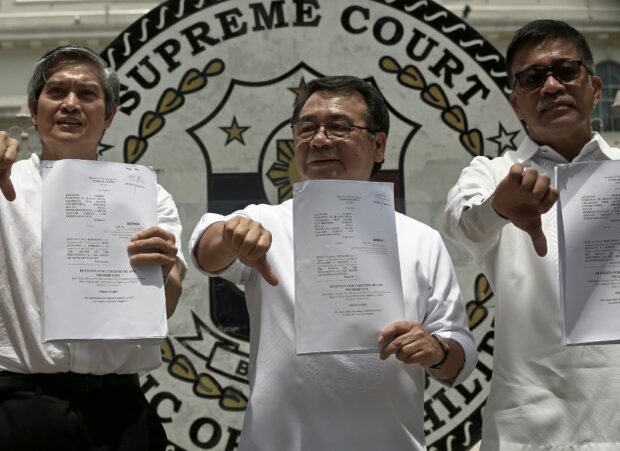
JUNK IT | Bayan Muna chair Neri Colmenares (center) and former Bayan Muna Reps. Carlos Isagani Zarate (right) and Ferdinand Gaite show to reporters copies of the petition they filed in the Supreme Court to declare the Maharlika Investment Fund Act of 2023 unconstitutional. (Photo by RICHARD A. REYES / Philippine Daily Inquirer)
MANILA, Philippines — The Supreme Court was asked on Monday to declare unconstitutional Republic Act (RA) No. 11954, or the Maharlika Investment Fund (MIF) Act of 2023, a petition that lawmakers said would not prosper because “exhaustive measures were taken” to meet all requirements of the 1987 Constitution and safeguards were installed against its misuse.
In a 56-page petition for certiorari and prohibition, the petitioners — Senate Minority Leader Aquilino Pimentel III, Bayan Muna chair Neri Colmenares, and former Bayan Muna Reps. Carlos Isagani Zarate and Ferdinand Gaite — challenged the constitutionality of the MIF by claiming that it is a “dangerous” law as it “entrusts hundreds of billions in public funds to unknown fund managers and an amorphous nine-member Board of Directors.”
Named respondents in the petition were Executive Secretary Lucas Bersamin, Finance Secretary Benjamin Diokno, the Senate, and the House of Representatives.
The petitioners also asked the high tribunal to issue a temporary restraining order or preliminary injunction or status quo ante order to stop immediately the implementation of RA 11954 and to set the conduct of oral arguments.
In challenging the law’s legality, they argued that President Ferdinand Marcos Jr.’s certification of MIF as urgent in Congress was void for failure to meet the constitutional requirements.
“The presidential power and prerogative to certify to the necessity of the immediate enactment of a bill under Article VI, Section 26 (2) of the 1987 Constitution is not absolute, but rather subject to the requirements,” they said, pointing out that the existence of a public calamity or emergency, the necessity of the enactment, and that such immediacy would justify doing away with the necessary legislative requirement, were all not present.
“The Court can take judicial notice of the fact that there was no declared state of calamity as defined by law which exists to necessitate the immediate passing of the Maharlika bill,” they said.
READ: Solons laud signing of MIF into law: Greater fiscal space for PH
READ: Maharlika chest at P107 billion; ‘gains seen in 4-5 years’
READ: High debt service, fiscal deficit? Why back Maharlika fund, asks Lagman
No violation
The House ways and means panel chair, Rep. Joey Salceda, one of the law’s authors, maintained on Monday that Congress took exhaustive measures to ensure that the MIF fulfilled the requirements of the Constitution and has included adequate safeguards against possible misuse.
In a message to the Inquirer, Salceda, who represents Albay, said he respected the right of the petitioners to question the law in court, “but I argue that the Maharlika Investment Fund Act is akin to the creation of any other government financial institution or government corporation. The Supreme Court tends to give wide latitude and tolerance on congressional action on such matters.”
Salceda added: “Exhaustive measures were taken, most definitely by the House, to ensure that safeguards were installed and constitutional requirements were met.”
Independent opposition lawmaker and Albay Rep. Edcel Lagman agreed with the sentiments of the petitioners in questioning RA 11954, but he noted that “there appears to be no constitutional provision violated” in the process of enacting it into law.
In a message to the Inquirer, Lagman maintained that the challenged MIF Act “lacks fiscal and economic wisdom and is ill-timed because of the negative economic indicators besetting the country today.”
“Unfortunately, congressional wisdom is not a justiciable issue as ruled by the Supreme Court in many cases. The Supreme Court has also ruled that the seasonableness of a law is left to the discretion of the legislators and the high court will not interfere in such determination,” he added.
Lagman noted that the Supreme Court also “consistently held that the presidential certification of urgency of a measure pending in the Congress is the sole political prerogative of the president on the existence of the reasons justifying certification.”
Economic viability
In the Supreme Court filing, the petitioners also argued that the House and the Senate violated the “no amendment” clause of Section 26 (2), Article VI of the 1987 Constitution.
House Bill No. 6608 was approved by the House on its third and final reading on Dec. 15, 2022, but the petitioners said the House amended HB 6608 on May 31, 2023, “not on the basis of a Bicameral Conference Report, but on the mere motion of Rep. Mikaela Suansing.”
On the other hand, the Senate amended an already approved bill and submitted to the president a version of Senate Bill No. 2020 that is different from the Senate-approved bill.
They noted that Senate records would disclose that substantial and lengthy amendments to the bill were introduced and approved by the Senate, but were not incorporated in the printed text sent to the president and signed by him.
“This being so, that bill embodied in the Enrolled Bill was not duly enacted and therefore such did not become law as RA 11954,” the petitioners said.
The petitioners also claimed that the MIF failed to satisfy the test of economic viability, which, they said, is among the limitations imposed by the Constitution to prevent the depletion of public funds.
They noted that the national treasurer submitted a three-page business proposal for the MIF in an attempt to comply with the test of economic viability.
“Although it is true that the business proposal … reflected promising estimated returns for the next 10 years, the computation on which the estimated returns were based was not even provided in order for Congress, and also the public, to study and review such basis,” the petitioners said.